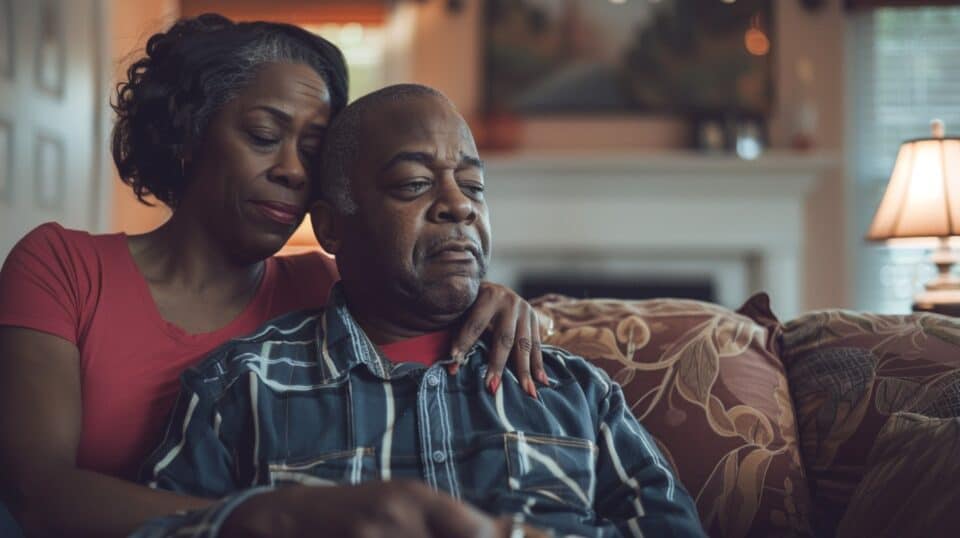Facing the challenge of job loss due to alcohol can be overwhelming. My husband’s firing after arriving at work with a .1 alcohol level highlights this struggle. This blog offers insights on handling legal avenues and rebuilding after such setbacks.
Stay tuned for our journey forward.
Key Takeaways
My husband was fired from his job for showing up drunk with a .1 alcohol level. This caused us to seek help through AA meetings and legal advice.
We learned about the strict workplace rules on alcohol use. His company required him to complete an inpatient alcohol treatment program without pay.
We explored legal options and found that even though New York allows employers to fire for alcohol misuse, federal laws offer some protection for workers diagnosed as having a disability due to alcoholism.
Supporting my husband’s recovery became our main focus. We used counseling, education on dependency, and developed a plan including health checks and skills training for career rebuilding.
Rebuilding after such a setback involves understanding your rights, seeking appropriate treatment, supporting each other through recovery, and strategically planning for future employment opportunities.
Table of Contents
Overview of the Incident

My husband lost his job because he drank at work. This shock sent us looking for AA Meetings Seattle to start fixing things.
Circumstances leading to job termination
He showed up at work after a late-night party, too much to drink under his belt. A breathalyzer caught him with a .1 alcohol level not just once, but twice. The rules were clear—no drinking on the job.
His company didn’t blink; they fired him for breaking the policy.
You broke our trust and our policy, they said.
Now he faced more than just shame. He had to cough up $600 plus undergo counseling for 5 weeks straight. To make things worse, JB Umphrey, an unemployment lawyer, was sure this “misconduct” would block any chance of getting unemployment benefits.
Immediate effects following the dismissal
Right after my husband lost his job because of drinking, our life flipped. His company suspended him without pay and said he couldn’t come back until he finished an inpatient alcohol treatment program.
They didn’t give a clear timeframe for this, just that they’d send the details later. We found ourselves stuck, waiting for paperwork that seemed to take forever.
During this time, we faced many challenges. Money became tight quickly. My husband felt hurt and ashamed, spending days in bed or at Alcoholics Anonymous meetings trying to find some hope.
I had to step up, calling employee assistance programs (EAP) for help and talking to lawyers about our options. The pressure was on me not just to support us emotionally but also financially as we figured out how long rehab would take and what steps were next for getting his life back on track.
Alcohol Policy Enforcement at Work

Every workplace has rules about drinking. These include what happens if you break those rules.
Overview of workplace rules on alcohol use
Many workplaces have strict rules about alcohol use. They say employees can’t drink while working or during work hours. If someone breaks these rules, the company might fire them without needing an alcohol test.
Some companies also have policies that let them suspend workers for as long as they want if there’s no written rule about how long a suspension should last.
If a worker is diagnosed as an alcoholic, federal laws might protect them as having a disability. This means the employer should offer help like sick leave or an employee assistance program instead of just firing them.
But even with these protections, employers can still make tough decisions if they think drinking hurts workplace safety.
Knowing your rights and your employer’s rules on alcohol can make all the difference.
Next, we look at how important it is to test for alcohol in the workplace.
Legal aspects of consuming alcohol during work hours
After discussing workplace alcohol policies, it’s clear that legal rules around drinking during work hours are strict. In New York, if someone works “at will,” their boss can fire them for any reason, including alcohol use at work.
This means there’s no legal safety net to stop job loss over drinking on the job. Cases show that similar situations often end in firing.
Key facts include that employers have the right to set rules about alcohol at work. They can use breath testing to see if an employee has been drinking. If the test shows alcohol, they may decide to let the person go immediately.
Consulting a lawyer could provide answers but might not change the outcome since New York law supports employers’ decisions in these cases.
Importance of Alcohol Testing in Employment

Breathalyzer tests play a big part in job decisions. They help bosses know if someone has been drinking and keep everyone safe.
Role of breathalyzer tests in termination decisions
Breathalyzer tests are key tools for bosses to make sure employees follow work rules about drinking. My husband faced this when his test showed a .1 alcohol level, not just once but twice.
The company didn’t need a legal go-ahead to use these tests for firing decisions. This made the test results super important in deciding my husband had to leave.
Employers lean on these tests heavily; they see them as clear proof of breaking alcohol policies at work. Even though there’s no law demanding a breathalyzer for firing someone, in my husband’s case, it was all the company needed.
They saw those numbers and said goodbye.
Knowing how crucial these tests can be changed everything for us.
Next up, we examine how accurate these alcohol testing methods really are.
Evaluating the accuracy of alcohol testing techniques
Accuracy in alcohol testing is key for fair work decisions. Two tests showed a .1 alcohol level, raising questions about reliability. The law and ethics guide the use of these tests at work.
Employers decide on testing based on clear rules. Tests like breathalyzers must give true results to protect jobs and follow legal steps.
Tests can sometimes make mistakes. False positives or negatives affect lives. For a correct call, the test should match with signs of alcohol problems—like slurred speech or trouble walking straight.
Legal experts and health care professionals confirm: trust in tests comes from repeated accuracy under different conditions—cold or hot weather, before or after eating. This ensures decisions rest on solid ground, not guesswork or faulty equipment.
Responses and Measures Taken by the Employer

The boss talked to my husband after the problem. They set up a plan for him to get better and keep his job safe.
Details of the suspension and rehabilitation requirements
My husband faced a tough situation. His job suspended him without pay and demanded he complete an inpatient alcohol treatment program.
- Job stopped his pay right away.
- He must finish an alcohol rehab program that stays with patients overnight. This shows the company wants him to get better.
- There wasn’t a set time for how long he needed to stay in the program.
- He reached out to his boss to get more details about what he needed to do next.
- We’re still waiting for the official papers from the company.
This process includes several important steps my husband has to follow, from not getting paid, needing to enter and complete a specific treatment plan, and dealing with unclear timelines without much information on how long it will take or what exactly is expected of him after finishing the program.
Employer-employee communication after the incident
After the suspension news hit us, my husband reached out to his boss for more information. They talked about what comes next. The company asked him to finish an inpatient alcohol treatment program.
He agreed, wanting to get better. Then, he waited for the corporate office to send over the details and paperwork.
During this time, we both felt left in the dark a bit. Communication from his job was slow. But finally, they confirmed everything through email and calls. They outlined steps for rehab and how he can return to work afterward—an employee assistance program (EAP) was mentioned too.
This is meant to help workers with personal problems or substance abuse that can impact their job performance.
Ethical Issues in Handling Workplace Alcohol Misuse

Firing workers without warnings for drinking raises big questions. It’s about fairness and how bosses should help their teams, not just cut them off.
Discussing the fairness of termination without warnings
Getting fired without any warnings is hard. Laws say it’s okay, but it doesn’t feel right. Many people lose their jobs because they drank too much. This raises big questions about what’s fair.
Employers have rules about drinking at work. If someone breaks these rules, companies might let them go right away. Yet, not giving warnings or help seems harsh. People with alcohol problems need support like rehabilitation programs or counseling from mental health professionals to get better.
Ethical issues come up when employees are terminated immediately for alcohol misuse without prior warnings or chances for improvement.
Next, we’ll talk about how employers handle these situations and what steps they take after an incident.
Employer responsibilities toward employees with alcohol issues
Employers must treat alcohol problems seriously. They have to provide help like counseling or substance abuse programs. This is because federal laws protect workers diagnosed as alcoholics under disability acts.
So, employers should offer support steps such as rehab or the twelve steps program for recovery.
They also need to ensure a safe work environment, which includes dealing with alcohol misuse responsibly. For instance, they can’t fire someone just for being an alcoholic without offering help first.
Next, we’ll talk about supporting your spouse through workplace challenges.
Supporting Your Spouse Through Workplace Challenges

Standing by your partner in tough times is key. I did my bit, showing him love and backing him up as he walked the road to getting better and facing job loss.
My role during the crisis
I sought legal advice to understand our rights after the suspension. We had to look at his “at will” employment and what it meant for us. Supporting him through recovery became my main goal.
Together, we delved into Alcoholics Anonymous (AA), seeking out meetings and resources to help with his dependence on alcohol. Planning for the future involved tough decisions about detoxification clinics and strategies for staying off alcohol.
We explored every legal option available post-dismissal, ensuring we knew how to fight back fairly. Consulting with an attorney was vital; they guided us through possible actions against unfair dismissal while considering health benefits options from past employers for treatments like outpatient treatment or help with psychiatric disorders related to alcohol abuse.
Every step of the way, I stood by him – from understanding his mental condition connected to drinking, looking into rehabilitation steps, to rebuilding a safe environment that fosters abstinence and recovery.
Recovery is not just about stopping drinking; it’s about starting anew.
Supporting my husband’s journey through recovery
After my husband lost his job due to drinking, we knew recovery was our next step. Here’s how we’re supporting his journey.
- We learned about alcohol dependency together. Knowledge helped us see the bigger picture and understand it as a chronic disease.
- Setting clear boundaries was crucial. We agreed on what behaviors were acceptable and which ones weren’t.
- Attending Al-Anon meetings gave me insight into other people’s experiences with similar struggles. It showed us we weren’t alone.
- Consulting legal experts ensured we understood his rights and protections at work, especially regarding health issues.
- Encouraging open communication helped us talk more freely about challenges, without judgment or blame.
- Education on relapse prevention taught us to recognize early signs of a setback and how to deal with them effectively.
- We developed a detailed plan for rehabilitation that included medical examinations for related conditions like fatty liver or cirrhosis of the liver.
- A balanced focus on self-care ensured I could support him without neglecting my own needs. Taking time for myself recharged my energy.
- Support from counselors who specialized in addiction improved our strategies for managing tough situations when they arose.
- Getting involved in rational recovery offered alternative methods to traditional approaches, adding variety to find what truly worked for him.
- Job hunting strategies were revisited only after significant progress in recovery, ensuring he felt ready to return to work with confidence.
Each step has its challenges, but staying committed makes all the difference in moving forward together.
Exploring Legal Options After Job Termination

After losing his job, we looked into legal help. Talking to a lawyer showed us the steps we could take.
Available legal actions post-dismissal
Getting fired brings tough times. Knowing your legal options can shine a light on the next steps. Here’s a clear list:
- Confirm details with a lawyer who understands employment laws. They know if you have a case against wrongful dismissal.
- Check if your situation falls under federal protections for workers diagnosed as alcoholics. Laws protect employees from unfair treatment due to medical conditions, including dependence on alcohol.
- File for unemployment insurance, even if advised against it due to misconduct. Lawyers often know ways to argue your eligibility.
- Look into whether New York’s “at will” employment rules apply, or if exceptions exist in your case.
- Ask about confidentiality rights regarding any disclosed health issues like hepatitis or mental health problems tied to alcohol use.
- Discuss the accuracy of the breathalyzer or other tests used for evidence in your termination—if flawed, they may not hold up legally.
- Explore options related to reasonable suspicion protocols—employers must follow certain steps before drug testing or making accusations.
Each option offers a path that could lead you and your husband toward recovery and justice after such a setback.
Importance of consulting legal experts in termination disputes
After understanding the available legal actions post-dismissal, it’s crucial to talk about reaching out to lawyers who know about job disputes. Lawyers give answers that fit the law perfectly, even if they might not be what you hoped for.
They also guide you through laws at a federal level and give advice on steps you can take after losing a job. This step is essential because it makes sure your fight against unfair dismissal stands on solid ground.
Lawyers are skilled in looking at employment contracts and knowing where your rights stand, especially in cases related to heavy drinking or drug issues at work. Their expertise helps clear up confusion and point out options that could include asking for your job back or getting some form of payment for the trouble caused.
With their help, facing human resource departments becomes less scary, making sure every letter and meeting with them counts toward fixing the problem.
Planning for the Future
We’re looking at steps to help my husband recover and rebuild his career. This includes getting help from a program for people who drink too much and finding new job opportunities that fit him better.
Rehabilitation steps and recovery progress
My husband faced a tough road after losing his job due to alcohol. We committed to a plan for his rehabilitation and recovery progress.
- First, we met with an EAP counselor who helped us understand the journey ahead.
- He joined a local Big Book group, connecting with others on similar paths.
- Daily routines changed to include meetings for recovering alcoholics, offering him a network of support.
- He underwent professional counseling to address underlying issues tied to his dependency on alcohol.
- Together, we learned about codependence and worked on strengthening our relationship without enabling his addiction.
- Regular health check-ups became crucial to monitor any physical effects from years of heavy drinking, like potential liver damage or heart problems.
- We focused on creating a balanced diet and exercise plan to improve his overall well-being.
- Financial planning sessions helped us manage the debts incurred from his time out of work and medical bills.
- He took part in skills training courses as part of career rebuilding efforts, aiming for sectors more aligned with his interests and new lifestyle.
- Volunteer work offered him a sense of purpose and gave back to the community, also adding valuable experience to his resume.
- Job searching strategies included networking with sober contacts and seeking employment in environments supportive of recovery.
These steps laid down a solid foundation for my husband’s return to a healthier life and work environment, showing that recovery is possible with the right support and determination.
Strategies for job hunting and career rebuilding after recovery
Rebuilding a career after recovery demands focus and strategy. It is a chance to start fresh and make positive changes. Here’s how:
- Update the resume to highlight strengths, skills, and any new certifications. Make it clear that time away was a period of growth.
- Network actively both online and offline. Attend industry meetups, conferences, and seminars to connect with potential employers.
- Use job search engines and company websites to apply for positions that match qualifications and interests.
- Create profiles on professional networking sites like LinkedIn. Engage with content relevant to desired industries.
- Practice interview techniques with a friend or mentor to build confidence and polish answers to tough questions about employment gaps.
- Consult an Employment Assistance Program (EAP) counselor for guidance on job markets post-recovery.
- Join support groups for individuals in recovery who are also seeking employment, such as through Al-Anon meetings for more resources and shared experiences.
- Research companies beforehand to find those with supportive policies for employees recovering from addiction or other health issues.
- Focus on health and wellness as part of maintaining a positive outlook during the job hunt – exercise, eat well, and maintain recovery protocols.
- Volunteer or take temporary assignments in the desired field to gain current experience and demonstrate commitment.
Each step ensures readiness for new opportunities while acknowledging the journey through recovery as part of personal growth and resilience-building.



